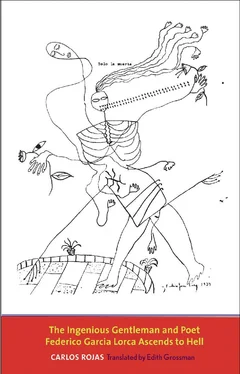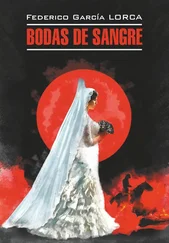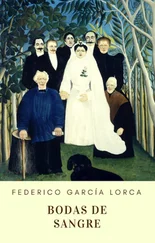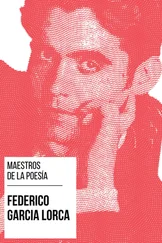A mute wind, like the one that seemed to shake Galadí in the Buick, carried him to the theater that anticipated Sandro Vasari’s memories. On the stage of the bronze monarchs, impassive gulls resting on their shoulders beneath the Baltic sky, the triumph of la ragione nuda e chiara on an afternoon resembling the afternoon of Corpus Christi, and the interview between Vasari and Ruiz Alonso in Madrid, there emerged now the street of an unknown city that his recollections of 1928 or 1929 guessed was North American.
On a corner a cement post like the ones marking bus stops in the New York of his youth, where he had seen the line of unemployed beside Saint Patrick’s, then witnessed the aurora borealis above the Edem Mills lake surrounded by bulrushes spattered with tiny snail shells, he made out the name of the street at its intersection with a deserted avenue: BRIARWOOD DRIVE.
A gray car drove along BRIARWOOD DRIVE and stopped before a house that had a small sloping front garden with azaleas in bloom. Someone blew the horn, and Sandro Vasari, taking long strides, came down from the porch, while a stranger holding a leather briefcase under his arm got out of the car. The two men stopped to greet each other at the foot of a myrtle tree. Sandro was half a head taller than his visitor, and both seemed the same age. Looking at them in the middle of the proscenium, he told himself they were probably close to half a century old, more or less, and thought, instinctively and inexplicably, that they could both be his sons if he hadn’t been killed that dawn on the Ainadamar road with Galadí, Cabezas, and Dióscoro Galindo González, the public school teacher from Pulianas. At that moment his death felt not like someone else’s, as it had on other occasions along the spiral of hell, but very distant and committed by people he could neither pardon nor despise, because on one hand they knew perfectly well what they were doing, and on the other he never wanted to consider them his enemies. He did a fast accounting of the past and decided that his sole vanity, a degree lower than his pride, was refusing to tell Valdés he was crazy.
On the glass-enclosed porch with open curtains, which perhaps in the days of another owner and a different generation might have been a conservatory, a small blond woman of uncertain, undetectable age, greeted the newcomer by extending her hand. He kissed her on both cheeks, but she turned her face to avoid returning his kisses. Looking at them, he thought that at one time she had hated and feared the man.
“Marina,” he said to her, “I suppose you won’t think now that I’ve been dreaming you and Sandro since the day I introduced the two of you at the university. How many years has it been? Perhaps thirty-five or more.”
“No. Now I’m finally convinced of my own existence,” she replied with no hesitation but no great satisfaction either. “Sandro and someone who died a long time ago filled me with that certainty.” She looked at the high clouds that gave the sky the tonality of slate, of the roof on a French house recently washed by rain. “The snow will begin soon.”
“It doesn’t look it,” Sandro Vasari observed.
“It doesn’t look it, but the first snow will start soon.”
Sandro invited them to sit on the porch. Three or four low bookcases filled with books in disorder seemed to have been placed haphazardly. They sat at an iron table painted black, and Marina served herself and Sandro coffee. She offered the recent arrival cognac in a very large tulip-shaped glass. An aroma of extremely old wooden barrels and aged wines aerated by the winds of time seemed to spread over the orchestra seats. He recalled the two cognacs he’d had with Martínez Nadal in Puerta de Hierro on his last day in Madrid, while the vans of the Assault Guards drove down Princesa and newsboys hawked papers. (“ … I moved writing for the theater, mine included, naturally, ahead by several generations. Perhaps entire centuries, though it may be hard for you to believe.”)
“Once, near your house, Sandro and I saw the characters from Blind Man’s Bluff dancing in the snow,” Marina said now in an abstracted tone. “When they disappeared, the title of another work by Goya was left on the snowy grass: Raging Absurdity. ”
The two men pretended to ignore the comment, though she expressed it in a tone of absolute veracity. On a round table covered by a red cloth, he could see a strange gray device topped by a kind of visor. Sandro Vasari pointed at it with a vague gesture and then said:
“When I interviewed Ruiz Alonso, in Madrid, he suspected I was hiding a tape recorder. He asked me whether I intended to write a book about the death of the poet, and I said I wanted only to write a dream. It was the truth.”
“In any case you achieved your goal.” The stranger took from the leather briefcase a stack of onionskin sheets, typed and hurriedly bound in cardboard. He left it on the table, leaning his open palm on the napkins. “I read your original and thought it was very acceptable. You ought to publish it.”
“I won’t,” Sandro Vasari obstinately shook his head, “though I’m not sorry I wrote it.”
“Why would you be sorry? Why don’t you want to publish it? I’m not trying to play devil’s advocate, but I admit it needs a good job of editing. I pointed out in the margin some passages you might rewrite. It’s the final pass of the pumice stone that Ortega thought indispensable for rounding out not only the form but also the content of any original. It all comes down to a few days of work before or after I take the book to a publisher.”
“You can take it to whomever you please and say it’s yours, if you like, to speed up publication. I give it to you gladly because I renounced the original though I don’t regret having written it, as I said before.”
“I don’t understand anything. You want to publish the book as if it were mine? How could you imagine I’d lend myself to that?”
“It’ll be better if we forget about it,” Marina interrupted. “Let’s talk about something else.”
“Absolutely not,” replied Sandro Vasari and then, in a different tone to the visitor: “If you don’t publish the book, neither will I. I’ll keep it, unsigned, in some drawer, and there my happy heirs, whoever they may be, will find it. They may even come to believe then that the original was yours. Which means you don’t help anything by refusing to accept it.”
“The snow’s coming earlier than we thought,” said Marina. “In this part of the country, the first snowfalls melt right away. They disappear in two days and are white tinged with pink, like the color of old coral and conch shells.”
From his orchestra seat in hell, he looked at her silently. Though her appearance might have been arrested at some very distant point in the past, and the years passed without disturbing her small features, he thought he could confirm her an age as similar to Sandro’s or their visitor’s. (“Marina, I suppose you won’t think now that I’ve been dreaming you and Sandro since the day I introduced the two of you at the university.”) Neither of them seemed to have heard his comment, as if in the theaters along the spiral unnoticed asides were possible. For a moment he forgot about them, and Sandro Vasari’s dream that later became a book about his own life and his stay in hell, to enjoy contemplating Marina. The pink, perishable whiteness of the first snows on BRIARWOOD DRIVE was merely an inevitable analogy or an obligatory identification with her brittle fragility.
“Fine,” the visitor seemed to give in. “Let’s hear the secret of so peculiar a decision. Or perhaps you’d prefer Marina to tell me about it, assuming she shares it with you. In any event, I’m all ears.”
Читать дальше












